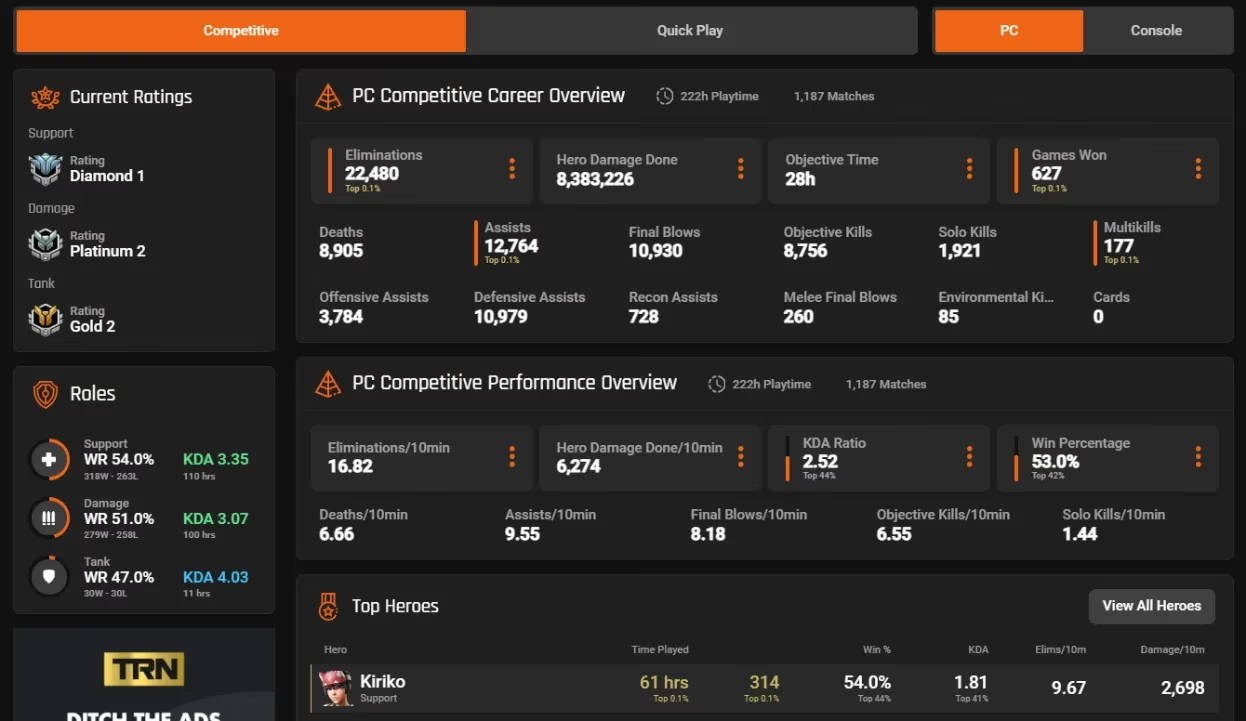Mastering Overwatch 2 with Game Trackers in 2025
Discover how Overwatch 2 game trackers revolutionize competitive play in 2025, offering powerful insights to boost performance and strategic mastery.
The landscape of competitive gaming continues to evolve in 2025, and Overwatch 2 remains one of the most popular team-based shooters worldwide. For serious players looking to improve their performance and track their progression, using an Overwatch 2 game tracker has become essential. These powerful analytical tools provide detailed insights that the game's built-in statistics simply cannot match.

Why Overwatch 2 Game Trackers Matter in 2025
As Blizzard continues to expand the Overwatch universe with new heroes, maps, and game modes, keeping track of your performance metrics has never been more important. The official in-game statistics system has long been criticized for inconsistencies and inaccuracies, making third-party Overwatch game trackers increasingly valuable for players seeking reliable data.
Many players report that the native stats system in Overwatch 2 suffers from persistent issues, including:
-
Subtraction of time from total time played
-
Mathematically impossible statistical calculations
-
Failure to record matches with certain heroes
-
Win counts that mysteriously decrease instead of increasing
These problems have plagued the game since its launch and, unfortunately, remain partially unresolved even in 2025.
Popular Overwatch 2 Game Tracker Options
Tracker.gg has established itself as the premier Overwatch 2 game tracker platform, offering comprehensive statistics and global leaderboards. Their system allows players to:
-
Compare personal stats against friends and favorite streamers
-
View detailed breakdowns by hero, map, and game mode
-
Track progression over time with visual graphs
-
Access global and regional leaderboards across numerous metrics

The platform has continuously evolved since Overwatch 2's release, now incorporating AI-powered insights that can identify patterns in your gameplay and suggest specific areas for improvement - a feature that has become indispensable in 2025's highly competitive environment.
How Professional Players Leverage Game Trackers
Professional Overwatch League players rely heavily on sophisticated Overwatch 2 game trackers to maintain their competitive edge. These tools provide granular insights into performance metrics that would otherwise remain hidden:
-
Accuracy percentages by weapon type
-
Ultimate charge rates compared to role averages
-
Positional heatmaps showing movement patterns
-
Team synergy statistics revealing optimal compositions
"Understanding the nuanced data that Overwatch 2 game trackers provide has completely transformed how we approach competitive play," explains OWL champion and coach Jae-hyeok "Carpe" Lee. "What was once intuition-based decision making is now backed by concrete statistics."
Integrating Tracker Data Into Your Training Routine
For players serious about climbing the competitive ladder in 2025, merely glancing at basic stats isn't enough. The most effective approach involves:
-
Setting specific statistical goals based on your current rank
-
Identifying underperforming heroes through comparison tools
-
Analyzing win rate patterns across different maps and team compositions
-
Reviewing performance trends over time to prevent skill plateaus
Many dedicated players now incorporate weekly "stat reviews" into their practice schedules, using Overwatch 2 game tracker data to inform their training focus for the coming week.
The Future of Overwatch 2 Game Trackers
As we move through 2025, Overwatch 2 game trackers continue to advance with new technologies. Machine learning algorithms now offer predictive insights, suggesting optimal hero selections based on map, team composition, and personal performance history.
The integration between tracking platforms and coaching services has also expanded, with some services offering automated video highlight creation based on statistical anomalies - both positive and negative.
Overcoming Stat Tracking Limitations
Despite the sophistication of modern Overwatch 2 game trackers, it's important to acknowledge their limitations. The most accurate data comes from PC players, as console API access remains somewhat restricted. Additionally, private profiles still present challenges for comprehensive stat tracking.
To maximize the effectiveness of your tracking:
-
Make your profile public if privacy isn't a concern
-
Regularly sync your account with your tracker of choice
-
Understand that some metrics (particularly those measuring "intangibles" like space creation) remain difficult to quantify
Conclusion
As Overwatch 2 continues to evolve in 2025, so too does the ecosystem of tools surrounding it. Game trackers have transformed from simple stat counters to sophisticated analytical platforms that provide actionable insights for players at every level.
Whether you're a casual player looking to improve or an aspiring professional seeking to optimize every aspect of your gameplay, leveraging an Overwatch 2 game tracker has become an essential part of the competitive experience. The gap between the game's built-in statistics and what third-party trackers offer has never been wider - and serious players are taking full advantage of these powerful tools.
For those looking to gain a competitive edge, the message is clear: the data is available, and those who harness it effectively will climb the ranks faster than those who don't.
Leave a Comment
0 Comments